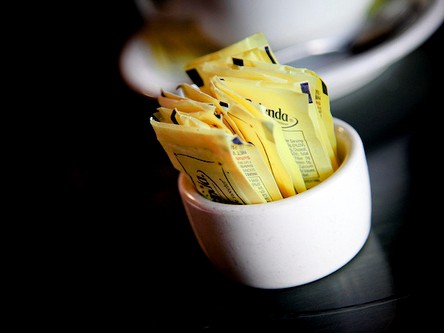
 A new study from the University of Manitoba has found a link between artificial sweeteners (often found in diet soda) consumed during pregnancy and overweight infants.
A new study from the University of Manitoba has found a link between artificial sweeteners (often found in diet soda) consumed during pregnancy and overweight infants.
The study looked at nutrition and diet questionnaires completed by 3033 mothers during their pregnancy and measured infants’ body-mass index (BMI) at one year of age.
The results showed that 29.5 per cent of expectant mothers consumed artificially sweetened beverages and that the infants of these mothers showed an increased BMI compared to infants from mothers who did not consume artificially sweetened beverages, such as diet soda, and were twice as likely to be classified as overweight at one year. Notably, the results were not found to be attributable to the mothers’ BMI, total energy intake or other obesity risk factors.
While rodent studies have already shown that nonnutritive sweeteners consumed during pregnancy predispose offspring to obesity, the current study proclaims to be, “the first human evidence suggesting that prenatal nonnutritive sweetener exposure may contribute to infant weight gain and early childhood obesity.”
The statistics for overweight and obesity in the early years are grim. Childhood obesity has more than doubled over the past 30 years and one-third of children in the developed world are either overweight or obese. Further, the connection between childhood overweight and lifelong problems with obesity and overweight has been well established.
“Metabolism, endocrine pathways and weight gain trajectories are ‘programmed’ during early development,” say the study’s authors, whose research is published in the Journal of the American Medical Association Pediatrics.
Depending on whether or not they contain calories, sweeteners are classified as either nutritive or nonnutritive. Nutritive sweeteners include sugars such as sucrose, fructose, dextrose and honey (which is 35 per cent glucose and 40 per cent fructose) while nonnutritive or artificial sweeteners include substances such as saccharin, aspartame and sucralose. Nonnutritive sweeteners have long been marketed as a healthy alternative to the use of sugars, but studies have recently begun to show that consumption of artificial sweeteners is in fact associated with increased risk of obesity, type 2 diabetes and increased cravings for more calories. (Health Canada has approved a list of artificial sweeteners declared safe for human consumption.)
“Despite the widespread and increasing consumption of nonnutritive sweeteners, their long-term effect on human health is poorly understood, and current intake recommendations are unclear, particularly for pregnant women and young children,” say the authors, who contend that further research is needed to replicate the findings in other cohorts and to study the underlying biological mechanisms associated with nonnutritive sweeteners.
In other research, scientists at Kyoto University in Japan have been able to alter a protein called thaumatin, which is derived from the fruit of an African tropical plant and deemed one of the sweetest sugar substitutes on the market, to make it even sweeter. Researchers used X-rays to find out which parts of the protein make it sweet from a human point of view and replaced the amino acid aspartic with asparagine, increasing the sweetness by 1.7 times, a result that could prove “a huge plus” for the food industry, according to the study’s authors.
Comment
One thought on “Don’t drink diet soda unless you want an overweight baby, study says”
Leave a Reply
You must be logged in to post a comment.


 Share
Share Tweet
Tweet Share
Share




I have been trying for 3years to get pregnant and needed help! i have Been going to the doctors but still nothing. The doctor said that me and my husband are fine and I don’t know where else to turn. Until one day my friend introduce me to this great spiritualist who helped her to get back her lost husband back with love spell and also made her pregnant, So I decided to contact this spiritualist native Iya basira after interaction with her she did a ritual for me and also instructed me on what to do, after then i should have sex with the my husband or any man I love in this world, And i did so, within the next one month i went for a check up and my doctor confirmed that i am 2weeks pregnant of female child. I am so happy!! if you also need help to get pregnant contact her email nativeiyabasira@yahoo.com